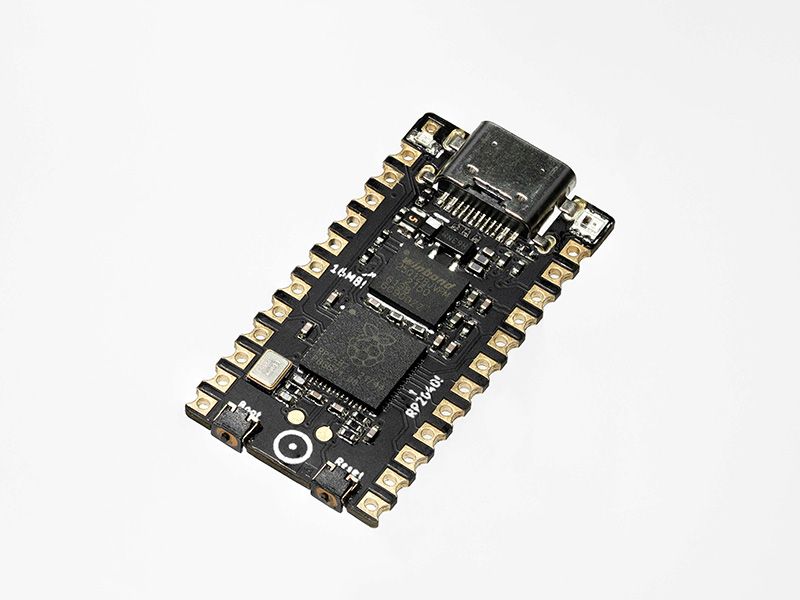
Blok by Boardsource
Blok’s elevate any keyboard compatible with Pro Micro Footprints and grants them instant access to a modern and feature-rich ecosystem. Users who don’t want to touch a text editor or config file don’t have to, Blok’s work out of the box with Peg. Users can map keys, set LED colors, configure rotary encoders, create OLED images, and much more all from within an easy to use visual program (GUI). Many of Peg’s features and configuration options are unavailable through any other flashing program built for yesterday’s ATmega32U4 processors. Now, deep configuration and rich features custom keyboards offer can be configured easily instead of becoming another project. On the other hand, users who enjoy in-the-editor programming, product development, design, or any other roll your solution will similarly love the Blok. Shipping with KMK and CircuitPython out of the box, Blok’s offer enthusiasts and creators a modern development environment limited only by your imagination instead of programming knowledge and hardware constraints. Create your entire keymap in Python within a single main.py file and test your changes instantly, no recompiling necessary. Remember, if this isn’t your thing — Peg can handle it for you.
Built on top of a powerful RP2040 ARM microprocessor and designed with the future in mind, Blok’s handle whatever you throw at them. Compared to older ATmega based controllers Blok’s have an incredible 100x the RAM, 8x the computing speed, 500x the ROM, are 32 bit instead of 8 bit, and are dual-core instead of single core. These are huge upgrades and allows for innovation and development within the custom keyboard space. Blok’s offer additional features and functionality compared to other RP2040 based controllers as well, such as OLED screen compatibility, innovative reset/boot switches accessible in any controller orientation, and a programmable RGB LED on-board.
Specifications
- RP2040 Controller
- Dual core
- 16MB ROM
- 133 MHz
- 32 bit processor
- 264kb RAM
- Height: 3.2mm (Height of USB C Port)
- USB Type-C
Features
- Compatible With All Pro Micro Footprints.
- Durable USB-C Port
- On-board Reset and Boot switch in accessible locations.
- Programmable RGB LED
- Extremely low profile
Purchase
Contribute
Have some info to add for this board? Edit the source for this page here.
CircuitPython 10.0.3
This is the latest stable release of CircuitPython that will work with the Blok. Use this release if you are new to CircuitPython.
Modules included in this download
_asyncio _bleio _bleio (HCI co-processor) _pixelmap adafruit_bus_device adafruit_pixelbuf aesio alarm analogbufio analogio array atexit audiobusio audiocore audiomixer audiomp3 audiopwmio binascii bitbangio bitmapfilter bitmaptools bitops board builtins builtins.pow3 busdisplay busio busio.SPI busio.UART codeop collections countio digitalio displayio epaperdisplay errno floppyio fontio fourwire framebufferio getpass gifio hashlib i2cdisplaybus i2ctarget imagecapture io jpegio json keypad keypad.KeyMatrix keypad.Keys keypad.ShiftRegisterKeys keypad_demux keypad_demux.DemuxKeyMatrix locale lvfontio math memorymap microcontroller msgpack neopixel_write nvm onewireio os os.getenv paralleldisplaybus pulseio pwmio qrio rainbowio random re rgbmatrix rotaryio rp2pio rtc sdcardio select sharpdisplay storage struct supervisor synthio sys terminalio tilepalettemapper time touchio traceback ulab usb usb_cdc usb_hid usb_host usb_midi usb_video vectorio warnings watchdog zlibIncluded frozen(?) modules: neopixel
Features: Breadboard-Friendly, USB-C, Castellated Pads
CircuitPython 10.1.0-rc.1
This is the latest development release of CircuitPython that will work with the Blok.
Alpha development releases are early releases. They are unfinished, are likely to have bugs, and the features they provide may change. Beta releases may have some bugs and unfinished features, but should be suitable for many uses. A Release Candidate (rc) release is considered done and will become the next stable release, assuming no further issues are found.
Please try alpha, beta, and rc releases if you are able. Your testing is invaluable: it helps us uncover and find issues quickly.
Modules included in this download
_asyncio _bleio _bleio (HCI co-processor) _pixelmap adafruit_bus_device adafruit_pixelbuf aesio alarm analogbufio analogio array atexit audiobusio audiocore audiomixer audiomp3 audiopwmio binascii bitbangio bitmapfilter bitmaptools bitops board builtins builtins.pow3 busdisplay busio busio.SPI busio.UART codeop collections countio digitalio displayio epaperdisplay errno floppyio fontio fourwire framebufferio getpass gifio hashlib i2cdisplaybus i2cioexpander i2ctarget imagecapture io jpegio json keypad keypad.KeyMatrix keypad.Keys keypad.ShiftRegisterKeys keypad_demux keypad_demux.DemuxKeyMatrix locale lvfontio math memorymap microcontroller msgpack neopixel_write nvm onewireio os os.getenv paralleldisplaybus pulseio pwmio qrio rainbowio random re rgbmatrix rotaryio rp2pio rtc sdcardio select sharpdisplay storage struct supervisor synthio sys terminalio tilepalettemapper time touchio traceback ulab usb usb_cdc usb_hid usb_host usb_midi usb_video vectorio warnings watchdog zlibIncluded frozen(?) modules: neopixel
Features: Breadboard-Friendly, USB-C, Castellated Pads
Absolute Newest
Every time we commit new code to CircuitPython we automatically build binaries for each board and language. The binaries are stored on Amazon S3, organized by board, and then by language. These releases are even newer than the development release listed above. Try them if you want the absolute latest and are feeling daring or want to see if a problem has been fixed.
Previous Versions of CircuitPython
All previous releases of CircuitPython are available for download from Amazon S3 through the button below. For very old releases, look in the OLD/ folder for each board. Release notes for each release are available at GitHub button below.
Older releases are useful for testing if you something appears to be broken in a newer release but used to work, or if you have older code that depends on features only available in an older release. Otherwise we recommend using the latest stable release.
